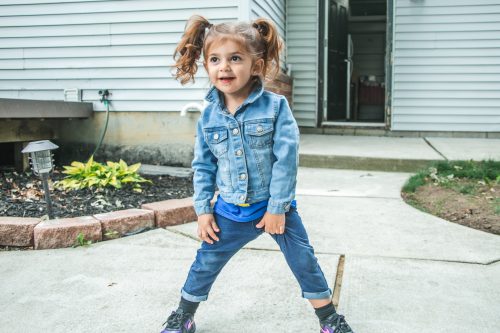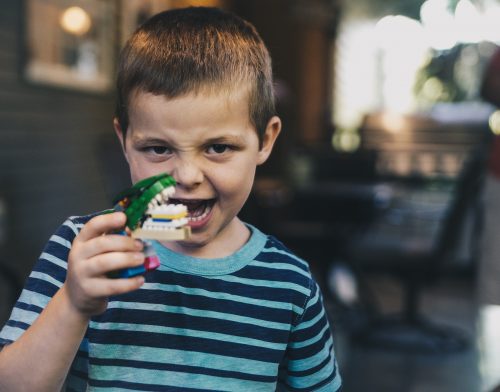Is your 3 year old not talking? If not, you likely have many questions. Join us as we uncover the many reasons your three-year-old may be having difficulty with speech as well as what you can do about it to make things better.
Is It Normal For a 3 Year Old Not to Talk?
Generally speaking, it is abnormal for a 3-year-old not to talk. A child that is this age is expected to say around 3-5 words at a time as they string together words and phrases to create meaning that is easily understood by caretakers and that can be understood by strangers as well.
If you have a three-year-old who is unable to speak, don’t worry. There are plenty of things you can do to help spur your child’s language development in the right direction.

3 Year Old Not Talking But Understands
You may find that your three-year-old isn’t talking but understands much of what you are saying. This may indicate there isn’t as much of a problem with your child’s language development as there is with their speech development. As you’ll learn later, speech and language development are two separate but closely related entities.
3 Year Old Talking Gibberish
Remember that 3-year-olds can be silly. Speaking in gibberish may be an attempt to gain attention or may be a sign of regression. However, if your little one seems to be speaking this way all of the time, contact your local pediatrician.
3 Year Old Not Talking Much
Toddlers at three years of age typically speak 200 or more words and usually can string together 3-5 word sentences. If your child doesn’t seem to be talking this much or only says sentences that are 1-2 words long, then there may be a reason for concern.
It should be noted, however, that some children take longer than others to develop proper speech. Once you begin to notice your child missing language development markers (see below for details) then you’ll want to share your concerns with your pediatrician as soon as possible.
The earlier the intervention the better when it comes to correcting speech and language.
3 Year Old Baby Not Talking Properly
Three-year-old children should not be expected to enunciate words with perfection. However, their speech generally turns out to be more “adult-like” at this age. Children at the age of three can begin to express their feelings, join in on the conversation, and ask who, what, when, where, and why questions.
If you are really concerned about how your child pronounces words or about the amount of words they can speak, speak with a pediatrician.

What Should a 3 Year Old Be Able to Say?
When trying to figure out whether or not your 3-year-old is on track in terms of language development, it can help to know what a child this age should be expected to say.
The following are speech and language expectations for three-year-olds:
- Can Speak Anywhere From 200-1,000 Words: Word usage varies from child to child. Thus, your child could be speaking anywhere from 200-1,000 words per day depending on his or her verbal development.
- Ask and Answer Questions: By age three, your child can often ask and answer questions posed to them. This includes questions that start with who, what, when, where, and why. This can make reading with your child very fun. You can begin to ask your child questions about the story you are reading to gauge comprehension.
- Form Plurals and Use Past and Present Tenses: In terms of grammar, you can expect a three-year-old to form plurals, past and present tenses. Though this won’t always be perfect. Words like “go’ed” instead of “went” are common, however, when your child is doing his or her best to insert correct tenses when possible are good signs.
- Interact With and Tell Stories: You may already know this, but three-year-olds have a very active imagination. As a result, your child may be able to recite and tell their own stories. Moreover, your child will likely be able to respond when posed with questions about age-appropriate stories you’ve read them. This is a great activity for those whose speech is on track and for those who may be experiencing speech or language delays as well.
- Recite Familiar Songs: Know a special nursery song that your child loves? Chances are that at age 3, your child can recite that song…over and over! Thus, this is a great age to teach and recite nursery rhymes and familiar songs with your child to continue to support his or her language development.
- Call Friends and Family By Name: Your child likely is able to refer to him or herself by name as well as their friends, family, teachers, and other caregivers as well.

Why Is My 3 Year Old Not Talking?
Speech and Language Delays
There can be a multitude of reasons why your 3-year-old isn’t talking. And not all of them are what you think. But before delving into what the causes for speech and language delays are, it is important to distinguish between the two.
A speech delay is when a child has trouble forming word sounds. They are not meeting standard milestones for speech as expected. Still, the child is usually able to understand what is being spoken to them. As a result, they may still be able to follow directions or gestures even when they aren’t able to verbally communicate like their peers.
A language delay is different in that the child will likely have trouble forming words and sentences, but may also have difficulty understanding what is spoken to them. Children with a language delay may not respond to questions or phrases directed at them, and not follow directions well.
Causes of Speech and Language Delays
The causes of speech and language delays vary. The following are a few reasons that some children may experience speech and language delays:
Tongue-Tie: A tongue-tie or other issue with the mouth can negatively impact a child’s speech. Children experiencing problems with their mouth may have difficulty pronouncing certain letters or words. Sounds for letters like D, R, and L are just a few examples of letter sounds that might prove difficult for tongue-tied children to pronounce.
- Lack of Stimulating Social Interaction: Believe it or not, a baby starts to watch lips and pick up on sounds from the moment they are born. However, these sounds aren’t yet duplicated by your baby until he or she is around 6 weeks old when vowels like “ooo” and “ahh” start to emerge. Because babies watch mouths closely, it is vastly important that you talk and interact with your baby as much as possible. In fact, the first three years of a child’s life are said to be the most intensive in terms of language development. Thus, if your baby isn’t spoken to much during this period, it could have a negative impact on his or her language development.
- Hearing Loss: Unfortunately, signs of hearing loss can be difficult to determine. Still, it is one of the major reasons that many children suffer from speech and language delays. That’s because when words are spoken, the exact phrasing or pronunciation of letter sounds may not be clear. The result is an inability to communicate effectively. To know whether or not your child may be suffering from hearing loss, be sure to schedule an appointment with a pediatrician.
- Neurological Issues: Sometimes certain disabilities, such as those connected to neurological issues, can harm speech and language development. Examples of neurological issues include cerebral palsy and muscular dystrophy.
- Cognitive Disability: Cognitive or intellectual disabilities can also be at play when a child is experiencing a speech or language delay. Again, your best bet is to see a pediatrician. They can run the proper tests and get you referred to other professionals who can help.

How Can I Encourage My 3 Year Old to Talk?
- Speak Directly to the Child: As previously mentioned, speaking directly to your child can have an incredible impact on his or her speech and language development. As you go throughout your day, narrate what is happening, and don’t be afraid to ask questions. It may seem silly at first if your child isn’t responding, but be patient and give it time. Your interaction with your child is helping more than you know, and they’ll love the extra attention!
- Reading: Reading to your child is one of the single best things you can do to grow his or her vocabulary and communication skills. By reading to your little one, you introduce them to words that they may not hear on a regular basis. Most three-year-olds are able to comprehend the majority of what is being spoken to them. This means you can ask questions about stories and offer explanations that will connect the child to the text and cause him or her to become more intrigued.
- Hypothetical Questions: Asking your child hypothetical questions such as “What would happen if…” and “What would you do if…” are great ways to get your child involved in the conversation. If your child doesn’t respond right away or responds with short phrases, be patient. Give your child time to formulate what he or she is going to say. Providing a stress-free low judgment environment for your child will cause them to grow leaps and bounds if you keep with it. Note: Even children that don’t have speech and language delays may “labor through” their speech or have difficulty phrasing sentences exactly as they wish to communicate them. This is normal! The important thing is not to rush them.
- Correct Gently: When it comes to correction, be sure to do it, but gently. One of the best ways to accomplish this is to repeat back to your little one what they’ve said incorrectly the correct way. This might sound like, “Wadda please?” You will respond: “Yes, you may have the water” (with extra emphasis on the sounds when you say it). Then, move on!
- See a Speech-Language Pathologist: If you are concerned about your child’s speech and language development, don’t hesitate to involve those that can help. A pediatrician can get you set up with the proper channels to help address the issues you are concerned about.

3 Year Old Speech Checklist
The following are speech and language milestones for three-year-olds
- Says 3-4 words or More Per Sentence
- Says 200 or More Words
- Follows Two-Step Directions
- Asks Questions
- Answers Most Questions
- Uses Plurals
- Tells a Story and Sing Simple Songs
- Call Familiar People By Name
Will My 3-Year-Old Ever Talk?
If you are concerned about the possibility that your three-year-old may never be able to talk, take heart! There are plenty of children that struggled with talking at an early age that are chatter-boxes today! The key is early intervention.
If you suspect something isn’t quite right with your child’s communication skills, don’t hesitate to seek help. Early intervention is one of the best things you can do to remediate a speech or language delay in a child. Some children who received intervention early go on to speak the same as their peers by the time they enter school.

FAQ
If your child isn’t at least saying 25 or more words by the age of two, it may be best to bring the situation up to your local pediatrician. Remember, early intervention is always best. There is no harm in asking!
A 3-Year-Old Who Is Not Talking May Be Concerning…
It is true that some children are simply late bloomers when it comes to speech and language. But the reality is that a child who isn’t talking by the age of three should be seen by a pediatrician. They can then refer you to professionals that can help.
Remember, early intervention is your best remedy for speech and language issues.
Read more on our blog:
- 6 Month Old Baby Activities For Development
- Best Activity Mat and Baby Gym for Infants Development
- Best Age Appropriate Toys for 6 Month Old to 1 Year
well does talking gibblish is also concerning?